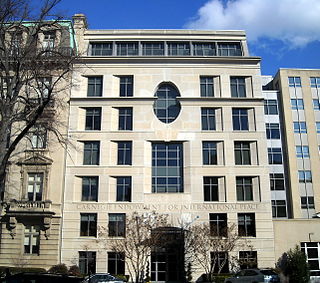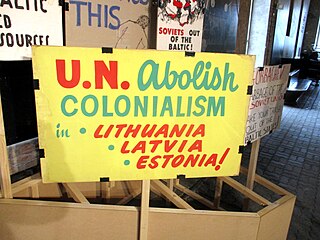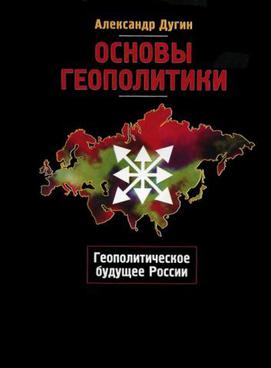Geopolitics is the study of the effects of Earth's geography on politics and international relations. While geopolitics usually refers to countries and relations between them, it may also focus on two other kinds of states: de facto independent states with limited international recognition and relations between sub-national geopolitical entities, such as the federated states that make up a federation, confederation, or a quasi-federal system.

The Baltic states or the Baltic countries is a geopolitical term, which currently is used to group three countries: Estonia, Latvia, and Lithuania. All three countries are members of NATO, the European Union, the Eurozone, and the OECD. The three sovereign states on the eastern coast of the Baltic Sea are sometimes referred to as the "Baltic nations", less often and in historical circumstances also as the "Baltic republics", the "Baltic lands", or simply the Baltics.

The Carnegie Endowment for International Peace (CEIP) is a nonpartisan international affairs think tank headquartered in Washington D.C. with operations in Europe, South and East Asia, and the Middle East as well as the United States. Founded in 1910 by Andrew Carnegie, the organization describes itself as being dedicated to advancing cooperation between countries, reducing global conflict, and promoting active international engagement by the United States and countries around the world. It is well-funded and characterized by elite leadership drawn from the business community and both major parties.

The three independent Baltic countries – Estonia, Latvia, and Lithuania – were invaded and occupied in June 1940 by the Soviet Union, under the leadership of Stalin and auspices of the Molotov-Ribbentrop Pact that had been signed between Nazi Germany and the Soviet Union in August 1939, immediately before the outbreak of World War II. The three countries were then annexed into the Soviet Union in August 1940. The United States and most other Western countries never recognised this incorporation, considering it illegal. On 22 June 1941, Nazi Germany attacked the Soviet Union and within weeks occupied the Baltic territories. In July 1941, the Third Reich incorporated the Baltic territory into its Reichskommissariat Ostland. As a result of the Red Army's Baltic Offensive of 1944, the Soviet Union recaptured most of the Baltic states and trapped the remaining German forces in the Courland pocket until their formal surrender in May 1945.

Russification, or Russianization, is a form of cultural assimilation in which non-Russians, whether involuntarily or voluntarily, give up their culture and language in favor of the Russian culture and the Russian language.

Russians in the Baltic states is a broadly defined subgroup of the Russian diaspora who self-identify as ethnic Russians, or are citizens of Russia, and live in one of the three independent countries – Estonia, Latvia, and Lithuania. As of 2021, there were nearly 900,000 ethnic Russians in the three countries, having declined from ca 1.7 million in 1989, the year of the last census during the 1944–1991 Soviet occupation of the three Baltic countries.

The Baltic Entente was based on Treaty of Good-Understanding and Co-operation signed between Lithuania, Latvia, and Estonia on 12 September 1934 in Geneva. The main objective of the agreement was joint action in foreign policy. It also included commitments to support one another politically and to give diplomatic support in international communication. The endeavour was ultimately unsuccessful, as the combined strength of the three nations and their statements of neutrality were insubstantial in the face of the massive armies of Poland, Germany and the Soviet Union.

Anatol Lieven is a British author, journalist, and policy analyst best known for his expertise on the Taliban of Afghanistan. He is currently a visiting professor at King's College London and senior fellow at the Quincy Institute for Responsible Statecraft.

Sergey Alexandrovich Karaganov is a Russian political scientist who heads the Council on Foreign and Defense Policy, a security analytical institution founded by Vitaly Shlykov. He is also the dean of the Faculty of World Economy and International Affairs at Moscow's Higher School of Economics. Karaganov was a close associate of Yevgeny Primakov, and has been Presidential Advisor to both Boris Yeltsin and Vladimir Putin. He is considered close to Putin and Sergey Lavrov.
The Estonian International Commission for Investigation of Crimes Against Humanity was the commission established by President of Estonia Lennart Meri in October 1998 to investigate crimes against humanity committed in Estonia or against its citizens during the Soviet and German occupation, such as Soviet deportations from Estonia and the Holocaust in Estonia.

The three Baltic countries, or the Baltic states – Estonia, Latvia, and Lithuania – are held to have continued as legal entities under international law while under the Soviet occupation from 1940 to 1991, as well as during the German occupation in 1941–1944/1945. The prevailing opinion accepts the Baltic thesis of illegal occupation and the actions of the USSR are regarded as contrary to international law in general and to the bilateral treaties between the USSR and the three Baltic countries in particular.

James Franklin Collins is a former United States Ambassador to Russia. A career Foreign Service Officer in the State Department, he is a Russian specialist.

Relevant events began regarding the Baltic states and the Soviet Union when, following Bolshevist Russia's conflict with the Baltic states—Lithuania, Latvia and Estonia—several peace treaties were signed with Russia and its successor, the Soviet Union. In the late 1920s and early 1930s, the Soviet Union and all three Baltic States further signed non-aggression treaties. The Soviet Union also confirmed that it would adhere to the Kellogg–Briand Pact with regard to its neighbors, including Estonia and Latvia, and entered into a convention defining "aggression" that included all three Baltic countries.

Andrew Carrigan Kuchins is an American political scientist, academic, and former head of American University of Central Asia. He has held senior positions at several think tanks, including Carnegie Endowment for International Peace, Center for Strategic and International Studies and Carnegie Moscow Center. Kuchins has written numerous books, articles, book reviews. He has been interviewed on mainstream and academic outlets including as CNN, Politico, The New York Times, The Washington Post, Washington Times, The Moscow Times, Chicago Tribune and CS Monitor. Additionally, Kuchins has given testimony before the United States Congress on Russia, Central Asia and the Caucasus.

Lilia Fyodorovna Shevtsova is a Kremlinology expert.

The Foundations of Geopolitics: The Geopolitical Future of Russia is a geopolitical book by Aleksandr Dugin. Its publication in 1997 was well received in Russia; it has had significant influence within the Russian military, police, and foreign policy elites, and has been used as a textbook in the Academy of the General Staff of the Russian military. Powerful Russian political figures subsequently took an interest in Dugin, a Russian political analyst who espouses an ultranationalist and neo-fascist ideology based on his idea of neo-Eurasianism, who has developed a close relationship with Russia's Academy of the General Staff.
Ronald Dietrich Asmus was a United States diplomat and political analyst. As U.S. Deputy Assistant Secretary of State for European Affairs (1997–2000), he was instrumental in the expansion of NATO to include former members of the Eastern bloc and acted as a leading policy designer in the U.S.–Europe relations.

Dmitri Vitalyevich Trenin is a member of Russia’s Foreign and Defence Policy Council. He was the director of the Carnegie Moscow Center, a Russian think tank. A former colonel of Russian military intelligence, Trenin served for 21 years in the Soviet Army and Russian Ground Forces, before joining Carnegie in 1994.

Agnia Grigas is a Lithuanian-born American political scientist and author writing on security and energy issues of Russia, Europe, and the Post-Soviet states. Grigas is known as the author of The New Geopolitics of Natural Gas, Beyond Crimea: The New Russian Empire and The Politics of Energy and Memory Between the Baltic States and Russia. Grigas holds a Doctorate in International Relations from the University of Oxford. She is a nonresident Senior Fellow at the Atlantic Council in Washington, DC.
Matthew Rojansky is an American academic, lawyer, and national security policy scholar. Rojansky is the director of the Kennan Institute at the Woodrow Wilson International Center for Scholars, which focuses on Russia and Ukraine issues. He is an adjunct professor at Johns Hopkins School of Advanced International Studies. He served as a director of the U.S.-Russia Foundation and founded the Carnegie Endowment for International Peace's Ukraine Program.















